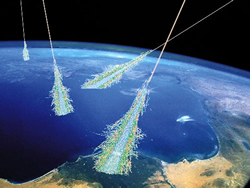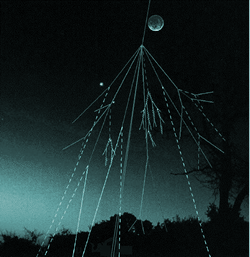    |
||||
 Cosmic
Rays Cosmic
Rays |
||||
|
They are produced by our Sun (when they are called the solar wind), stars, supernovae, neutron stars and black holes.
In 1960 a scientist called suggested that lower-energy cosmic rays come mainly from inside our own galaxy (the Milky Way), whereas those of higher energy come from more distant sources. He expected to see different numbers of low energy cosmic rays coming from various directions at us from within our galaxy because the galaxy is not arranged symmetrically around us. He found that the lower-energy rays had directions are scattered in a similar pattern and his idea was right.
If you live at a high altitude or go up in an aeroplane your radiation dose increases because you are hit by more cosmic rays! If you live nearer the poles you will receive a higher dose of cosmic radiation because the earth surface rotates more quickly at the equator than at the poles. also the atmosphere is deeper at the equator than at the poles. As these particles travel through the atmosphere, they interact with nitrogen molecules in the atmosphere, exciting the electrons in them and causing them to emit light (rather like the way a fluorescent light works). Cosmic rays have been detected with very high energies, we believe that they originate from quasars and active galactic nuclei. We do not know where these particles are coming from but a lot of exciting research is going on in that area. We have not got detectors that are able to detect cosmic rays of even higher energy but scientists are sure that super-energy Cosmic rays exist.. we just can't 'see' them with any instrument we have devised yet. |
||||
 |
||||

 Cosmic
rays originate in out in space.
Cosmic
rays originate in out in space.  The most well-known
source of cosmic rays is the Sun, with its solar wind. These particles
have a characteristic energy limit and so we know that the super high
energy ones are coming from something more powerful than our Sun.
The most well-known
source of cosmic rays is the Sun, with its solar wind. These particles
have a characteristic energy limit and so we know that the super high
energy ones are coming from something more powerful than our Sun. 
